You have a great business idea. It’s something innovative and scalable. But there’s one thing stopping you from moving forward – you’re not sure if you’re building a startup or a small business.
You’ve Googled it – Startup vs Small Business. And you’ve seen the same surface-level answers. But none of them tell you what you really need to know: how the difference impacts –
- Your funding,
- Your growth strategy,
- Your mindset, and
- The way you build your team.
No worries, in this post, we will clear that up for good.
You’ll get the real, practical difference between a startup and a small business, backed by examples, key comparisons, and a checklist to help you decide which path is right for you.
So, let’s get started!
What Is a Startup?
A startup is built to grow fast.
It usually begins with a unique idea, something that solves a problem in a new or better way. The goal isn’t just to make money. It’s to scale quickly, attract investors, and eventually become a big player in the market.
Startups are high-risk, high-reward.
They often operate with limited resources at the beginning. But they aim for rapid growth by building products that can serve a global or massive audience. Think of companies like Airbnb, Canva, or even OpenAI when they started.
The culture in startups is usually fast-paced, innovative, and flexible. You move quickly, test ideas, make mistakes, and learn fast. In a startup, speed matters more than perfection, and growth matters more than short-term profit.
What Is a Small Business?
A small business is built for stability.
It’s usually focused on serving a local or niche market. The goal is to become profitable, stay sustainable, and support a lifestyle, not to chase rapid growth or raise millions in funding.
Small businesses are often bootstrapped.
That means they’re funded by the owner’s savings, personal loans, or early revenue. Think of local shops, service providers, agencies, consultants, or even small eCommerce stores.
The mindset is different, too. You’re not trying to “disrupt” anything. You’re focused on building a strong foundation, offering great service, and running a business that can last. And that’s not a bad thing. In fact, for many people, this is the better path.
Startup vs Small Business – Key Differences

Startups and small businesses differ in many ways. Their goals, funding methods, risk levels, and growth strategies set them apart. Each point shows a key difference that you need to understand when choosing a path.
Below are the main points we will cover:
Now, let’s get into the details!
01. Business Goals
Startups aim for fast growth and massive impact. The goal is to scale quickly, reach a large audience, and often become a market leader. Most startups are designed with expansion in mind, national or global. They don’t just want to survive. They want to dominate.
Small businesses, on the other hand, focus on consistency and sustainability. The goal is to become profitable, serve a specific market, and stay in business for the long run. Growth is still important, but it’s measured, intentional, and usually local.
- So while a startup might chase user growth over profits in the early days, a small business is more likely to chase revenue from day one.
02. Funding Methods
Startups often rely on outside investors. They pitch to venture capitalists, angel investors, or incubators to raise large amounts of capital. That money helps them grow fast, hire quickly, and build out the product or service.
It’s not uncommon for startups to go through multiple funding rounds. Seed, Series A, Series B, you’ve probably heard those terms. The catch? You give up equity and control in exchange for cash.
Small businesses usually take a different route. They’re often bootstrapped, meaning the owner uses personal savings, small loans, or early profits to run the business. Bank loans, SBA loans, or help from friends and family are common, too.
If you are in the US and looking for a government grant, you can check this article on the top USA grants for entrepreneurs to launch your business.
03. Risk Level
Startups take big swings. They’re built on untested ideas, new markets, or innovative solutions. That means higher potential, but also higher chances of failure. Many startups don’t make it past the first few years.
The risk is part of the game. Founders often accept short-term losses in hopes of long-term breakthroughs.
Small businesses are usually less risky.
They’re built around proven models, like selling a service, running a local store, or offering something people already need. The chances of stable income are higher, especially if the business is run well.
But lower risk often means slower growth. You’re not trying to change the world. You’re trying to run a profitable, steady business.
04. Growth Strategy
Startups are built to scale fast. The goal is to grow quickly, reach as many users or customers as possible, and grab market share before anyone else does. That’s why they focus on automation, tech, and systems that can handle rapid expansion.
Growth is often the top priority, even more than profit at the beginning.
Small businesses grow slowly and steadily. They usually expand when it makes sense financially. That could mean opening a second location, hiring a few more people, or adding new products over time.
The focus is on sustainable growth, not explosive scaling.
05. Legal Structure
Startups are usually formed with future funding in mind. That’s why many go for structures like C-Corporations or Delaware LLCs. These make it easier to issue shares, bring in investors, and scale legally across states or even countries.
The setup can be a bit complex, but it’s designed to support rapid growth and multiple funding rounds.
Small businesses, on the other hand, often go for simpler structures. Most start as sole proprietorships, partnerships, or LLCs. These are easier to manage, cost less to maintain, and work well for local operations.
In short, startups build their legal foundation for scaling. Small businesses build it for simplicity.
06. Exit Plan
Startups are often built with an exit in mind. That could be an IPO, a big acquisition, or a merger. The goal? Cash out after rapid growth. Founders, investors, and early employees all hope to make a big return when the time comes.
It’s part of the startup playbook: build fast, grow big, and exit with a win.
Small businesses usually don’t think about exits in the same way. Many owners plan to run the business for years, pass it on to family, or eventually sell it to another small business owner. The business is often more personal, so the exit is slower and more grounded.
07. Team Size and Culture
Startups often start small, but they grow teams quickly. It’s not unusual for a startup to hire fast once funding comes in. The team usually wears multiple hats, works long hours, and pushes hard to hit big goals.
The culture is fast-paced, experimental, and sometimes chaotic. Change happens often, and flexibility is a must.
Small businesses tend to grow their teams slowly. Many start with just the owner or a small group of employees. Roles are more defined, and work-life balance is usually more stable.
The culture is focused, consistent, and more personal. Decisions are less rushed, and the pace is easier to manage.
08. Market Focus
Startups usually go after new or untapped markets. They try to disrupt industries, change how things are done, or introduce something the world hasn’t seen yet. The focus is often broad, sometimes even global.
They take risks on ideas that could scale big, even if the market doesn’t fully exist yet.
Small businesses stick to proven markets. They serve local communities or niche groups with clear needs. The goal isn’t to disrupt. It’s to deliver steady value to a target audience that already exists.
They succeed by doing what works and doing it well.
09. Profit Focus
Startups usually delay profits. In the early stages, they often spend more than they earn. The goal is to grow first, then figure out how to make money at scale. That’s why many startups run at a loss for years.
The focus is on user growth, market share, and long-term valuation, not immediate revenue.
Small businesses think differently. Profit is a priority from day one. They need to pay bills, cover expenses, and keep the lights on. That means every dollar counts, and pricing, margins, and cash flow matter a lot.
Startup vs Small Business: Main Differences at a Glance
After coming this far, now we hope that you have already sorted out the differences between startups and small businesses.
That being said, here we are going to share a comparison table for a quick recap:
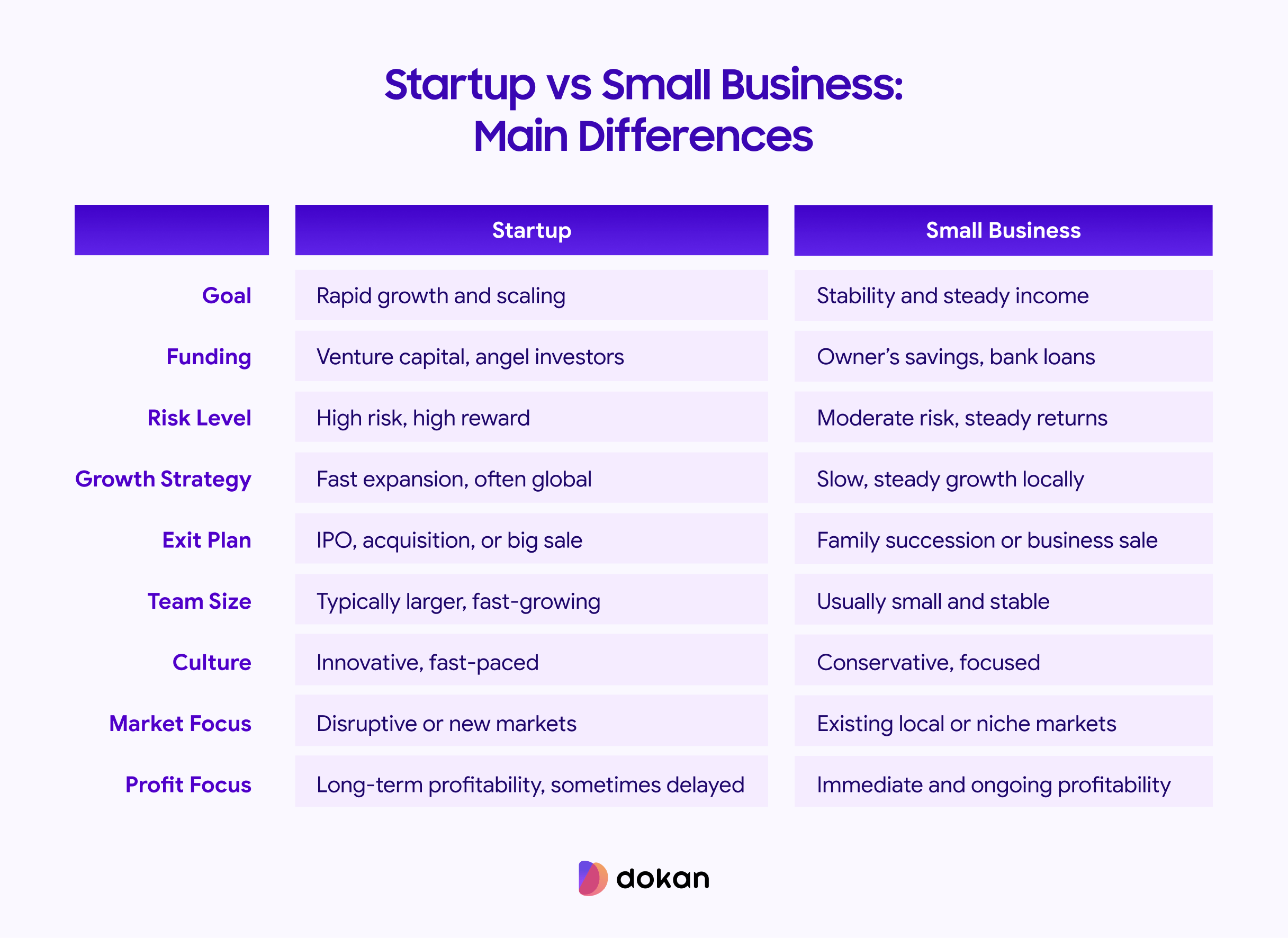
Two Successful Real-Life Case Studies
There are lots of companies that have become successful by following the startup or small business model. In this segment, we are going to share two such successful case studies with you:
Case Study 01 – Airbnb (Successful Startup)

Airbnb started in 2008 as a simple idea by Brian Chesky and Joe Gebbia. They wanted to rent out air mattresses in their apartment to cover rent. It was risky and small at first. But their goal was clear: create a platform that lets anyone rent out their space, anywhere in the world.
They raised venture capital to grow fast, improve their platform, and expand globally. They focused on scaling quickly, reaching millions of users, and disrupting the traditional hotel industry.
Today, Airbnb is a multi-billion-dollar company operating worldwide. It’s a textbook example of a startup that began with a bold idea, took big risks, raised investor money, and grew rapidly to dominate a market.
Case Study 02 – Magnolia Bakery (Successful Small Business)
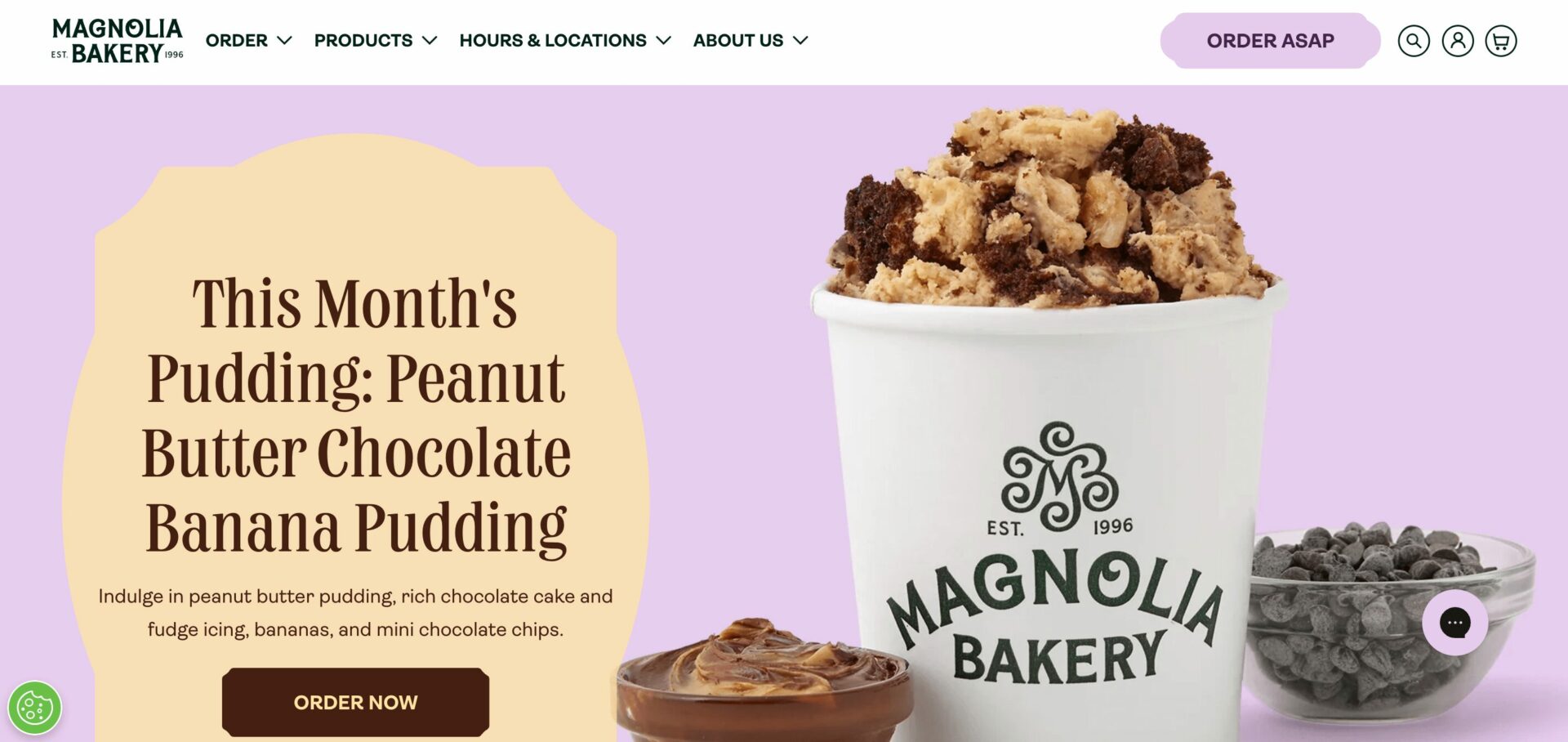
Magnolia Bakery started in 1996 as a single bakery in New York City. Founded by Jennifer Appel and Allysa Torey, it focused on classic American baked goods like cupcakes and banana pudding.
Their goal wasn’t rapid growth or global domination. Instead, they aimed to create a loyal local customer base by offering quality, homemade-style treats.
Magnolia Bakery grew slowly and steadily. Over time, it opened more locations but kept a focus on consistency and customer experience. It didn’t rely on outside investors but reinvested profits to expand.
Today, Magnolia Bakery is a beloved small business with a strong brand known for quality and tradition. It shows how a small business can succeed by focusing on sustainability and local love.
Small Business vs Startup: Which One Is Right for You?
Choosing between a startup and a small business depends on what you want from your venture.
If you’re ready to take big risks, want to grow fast, and dream of changing an industry or reaching millions, a startup might be your path. You’ll need to handle uncertainty, seek investors, and focus on scaling.
If you want steady income, control over your business, and a clear path to profitability, a small business could be a better fit. It’s about building something lasting, serving your community, and growing at your own pace.
Think about your goals, your risk tolerance, and the lifestyle you want. Both paths can lead to success, it’s just a matter of what success means to you.
Common Myths People Still Believe
There are a lot of myths around startups and small businesses that confuse even smart entrepreneurs.
One big myth is that all startups are small businesses. They’re not. Startups are built to scale fast, while small businesses focus on steady growth.
Another myth says small businesses can’t innovate. That’s wrong. Many small businesses find smart ways to serve their customers better every day.
People also think that startups always succeed if they get funding. But the reality is that many startups fail despite big investments.
And some believe small businesses don’t face risks. They do, just different kinds. It’s about steady survival, not rapid disruption.
Startup vs Small Business: Which Model Are You Going to Use?
Now you know the real difference between startups and small businesses.
One chases fast growth, big risks, and big rewards. The other focuses on steady income, stability, and long-term success.
Neither path is better or worse. It all comes down to what fits your goals, your style, and your life.
Take a moment to think about what you really want. Then pick the model that helps you get there. Whatever you choose, stay focused, work smart, and keep moving forward.
Want to explore the best eCommerce tools? Check our recommended eCommerce tools to grow your business fast.
Now, if you have anything related to this blog to share, use the comment section to do that. We would love to know your feedback. Take care!
Subscribe to
Dokan blog
We send weekly newsletters, no spam for sure!

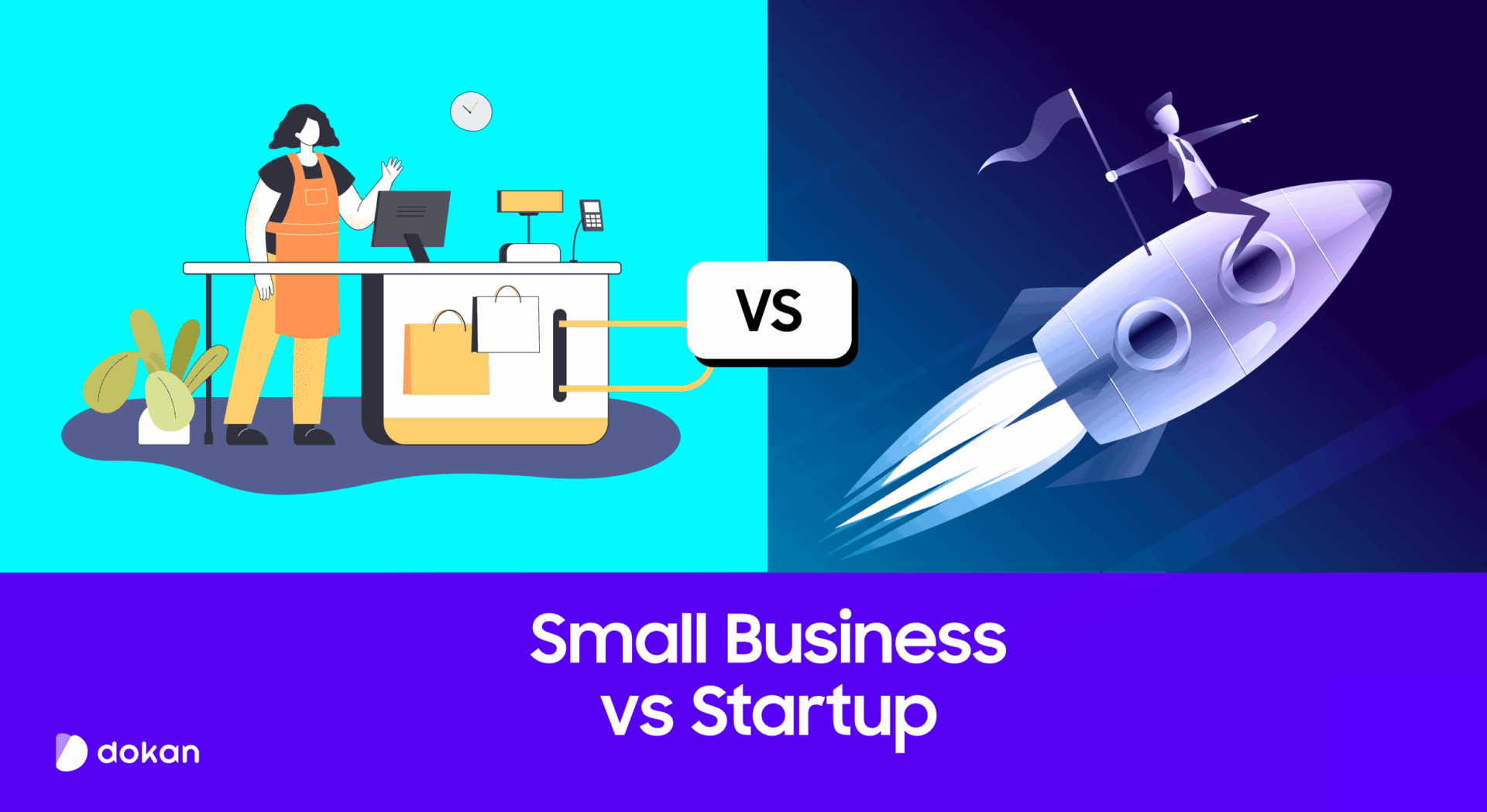


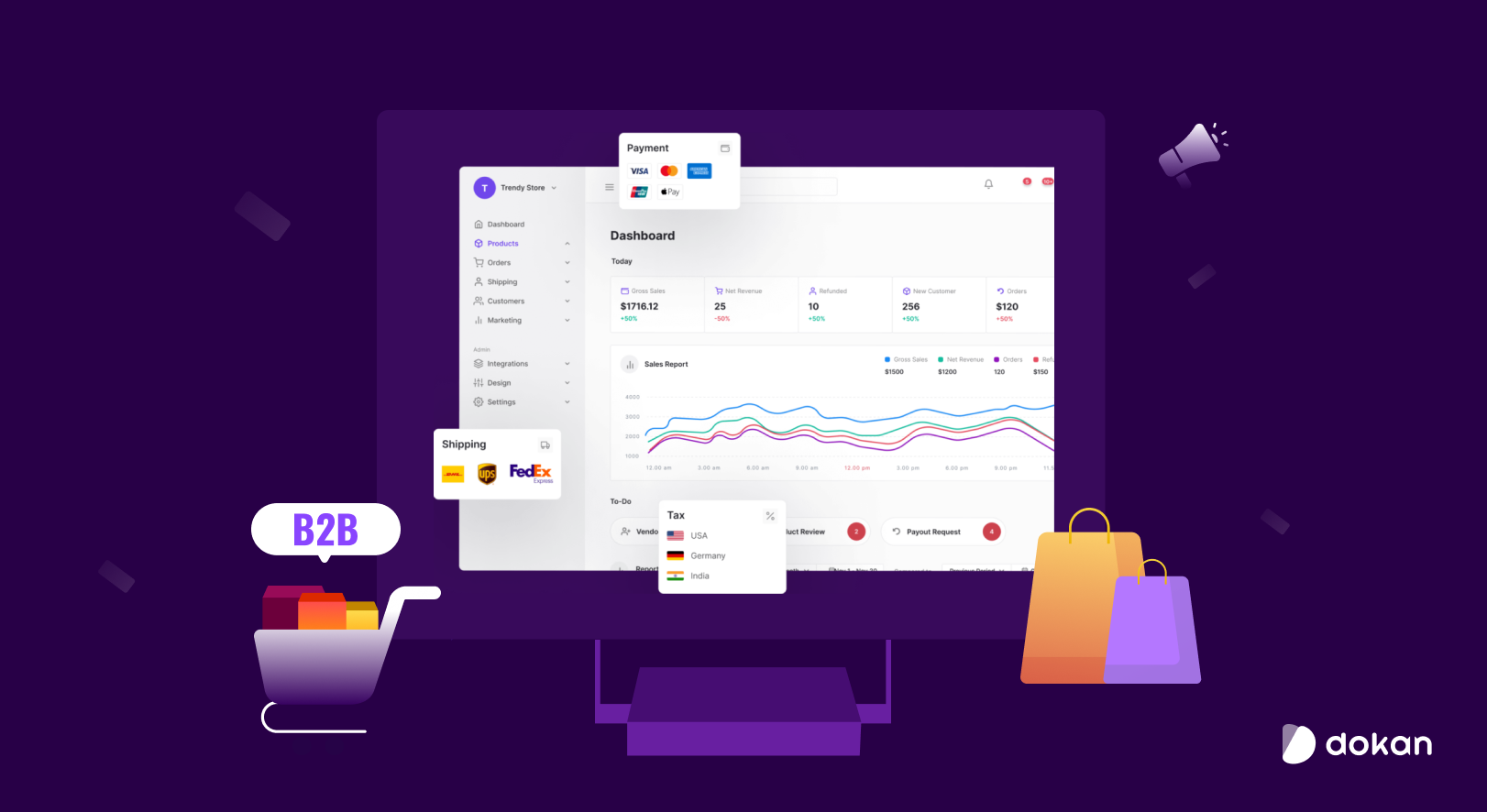
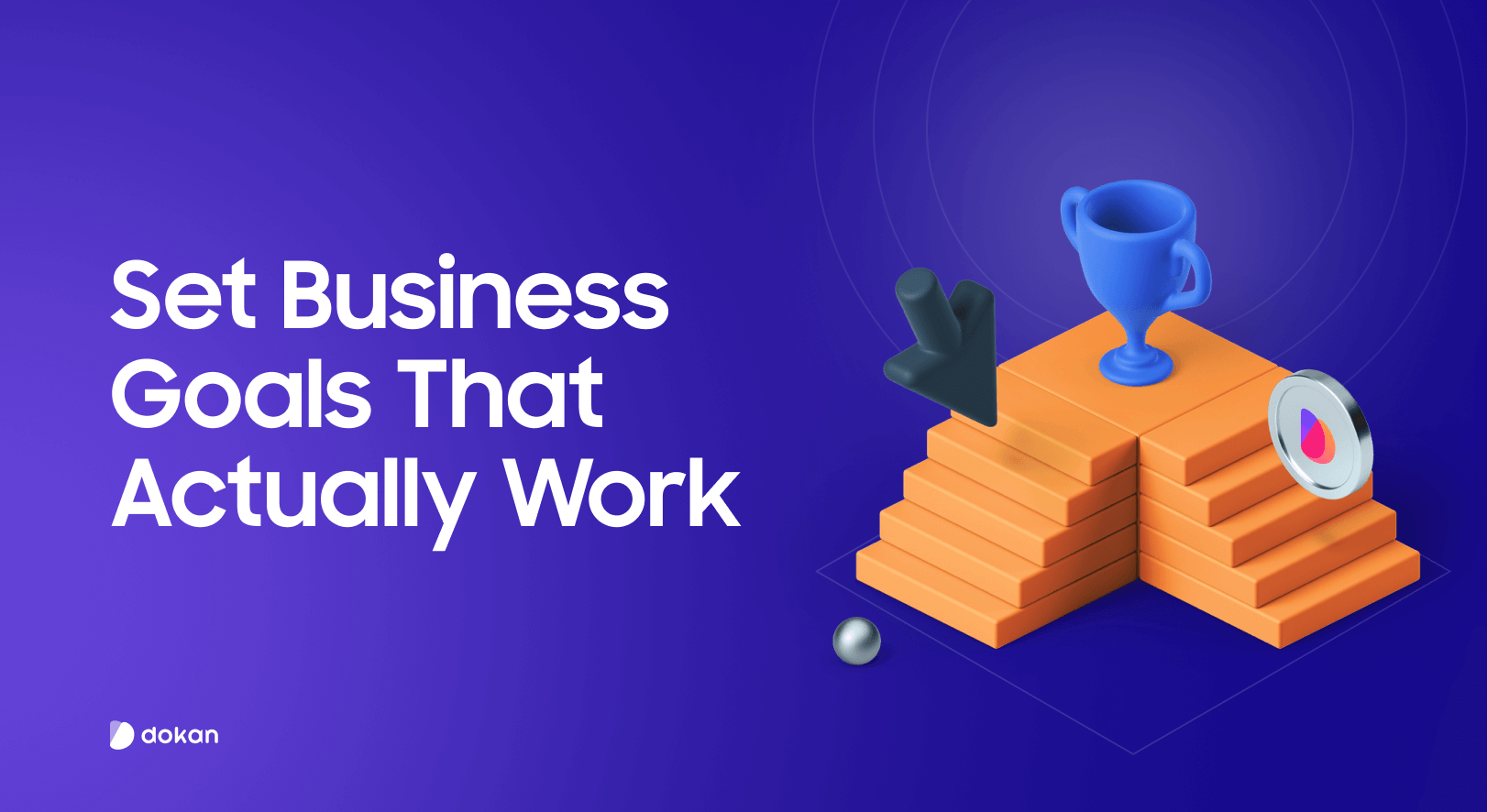

Leave a Reply